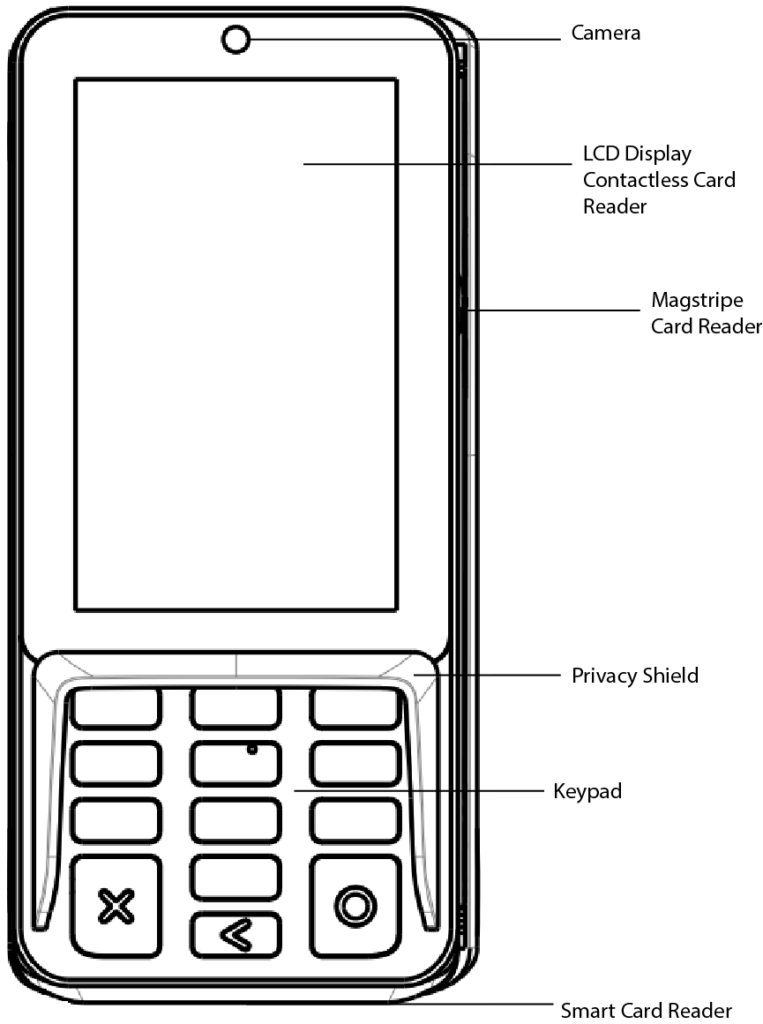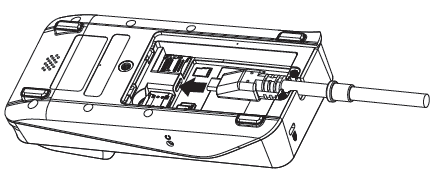CONTENTS CHECKLIST
Please check the box contents after unpacking. If any components are missing, or if there is a page missing from the quick setup guide, etc., please contact the dealer.
| Name | Qty. |
| A35 POS Terminal | 1 |
| Quick Setup Guide | 1 |
| Communication Cable | 1 |
| AC Power Adapter | 1 |
PRODUCT DESCRIPTION
The following section points out the various hardware features and functions of the A35.
Front View

INSTRUCTIONS
The A35 connects to a POS or an ECR by a communication cable for entering password, tapping a contactless card, swiping a mag stripe card, inserting a smart card or reading 1D/2D codes during the transaction process. To use it correctly, you should refer to the following instructions:
1) Power Connections
Power can be supplied to the A35 by connecting the AC power adapter to the communication cable in the case of RS232 or USB configurations, or via a powered USB cable (12V Powered USB) where the connected POS terminal provides the power.
2) Reset
Press and hold the ‘X’ and ‘O’ button for 5-8 seconds, the operation system will reset.
3) Communication cable
① Remove the back cover (At the bottom of the terminal).
② Place the communication cable head into the Type-C interface.

4) SAM Cards
① Remove the back cover (At the bottom of the terminal).
② Insert the SAM cards to the corresponding card slot(s).
5) microSD Card
① Remove the back cover (At the bottom of the terminal).
② Insert the microSD card to the corresponding card slot.
6) Magnetic stripe card reader
To use the magnetic stripe card reader, put the magnetic stripe side of the magnetic card towards the device interior, swipe the card with a steady speed through the magnetic reader slot.
(Supports bi-directional swiping).
7) IC card reader
To use the IC card reader, insert the IC card chip side upward, push in the IC card slot to bottom.
8) Contactless card reader
To use the contactless card reader, tap the contactless card on the Top LCD screen area of the device, indicated by the universal contactless icon on the screen, when prompted.
9) 1D/2D code reader
To use the 1D/2D code reader, put the 1D/2D code towards the top center area of the LCD.
10) Electronic signature
A35 supports electronic signature. Please be sure to use the finger to sign, do not use metal or sharp objects to operate the touch screen, so as not to damage the touch screen.
11) Terminal Anti-theft
A35 provides a Kensington security hole on the rear side of the terminal, the end users can lock the terminal on the countertop with a Kensington lock if necessary.
12) Audio Jack
If required, a visually disabled person can connect a headphone to the terminal for audio prompting if the terminal application supports this using the 3.5mm output audio jack.
GENERAL USAGE TIPS
- Avoid placing this product in direct sunlight for extended periods, or in environments with excessively high temperature, moisture or dust.
- Only qualified personnel should repair this product.
- Before using cards in the chip and magnetic stripe readers, please ensure they are free from any foreign objects.
PASSWORD ENTERING TIPS
It is highly recommended to enter the password in the following ways:
- Set up anti-peep shields. Enter password with shield by the structures of cashier desk.
- Place the POS terminal at an appropriate angle and make sure it is difficult to see the password. For example, the POS was installed above the movable bracket.
- In enter password perspective, avoid surrounding video surveillance.
- Paste text instructions to remind the customers to shield with body or palm when entering password.
- Merchants can also choose other ways to protect the customer input password.
ENVIRONMENTAL PARAMETERS
Working Environment: Temperature: 0℃~45℃(32℉~113℉)(Non-Charging) Humidity: 5%~96% (non-condense)
Storage Environment: Temperature:-20℃~70℃(-4℉~158℉)(Non-Charging) Humidity: 5%~95% (non-condense)
CLEANING THE DEVICE
- Do not use industrial strength or abrasive cleaner as it may damage or scratch the screen.
- Do not immerse the device in water or liquid.
- Do not spray water or cleaner into ports.
- To clean the screen, apply distilled water or mild glass cleaner onto a soft, lint-free cloth and gently wipe terminal.
TERMINAL USAGE TIPS
- If any cables become damaged, seek a replacement.
- If there is any suspicious object, please report to the related administrator.
- Do not insert unknown materials into any port on the IM20; this may cause serious damage.
- If repairs are required, please contact a professional technician instead of attempting them on your own.
- Avoid exposing the device to an excessively hot, dusty, or strong electromagnetic environment.
- Do not vibrate, shake, or drop the device.
CAUTION: Changes or modifications not expressly approved by the party responsible for compliance could void the user’s authority to operate the equipment.
FCC COMPLIANCE STATEMENT
This device complies with Part 15 of the FCC Rules. Operation is subject to the following two conditions: (1) this device may not cause harmful interference, and (2) this device must accept any interference received, including interference that may cause undesired operation.
Changes or modifications not expressly approved by the party responsible for compliance could void the user’s authority to operate the equipment.
This equipment has been tested and found to comply with the limits for a Class B digital device, pursuant to Part 15 of the FCC Rules. These limits are designed to provide reasonable protection against harmful interference in a residential installation. This equipment generates, uses and can radiate radio frequency energy and, if not installed and used in accordance with the instructions, may cause harmful interference to radio communications. However, there is no guarantee that interference will not occur in a particular installation.
If this equipment does cause harmful interference to radio or television reception, which can be determined by turning the equipment off and on, the user is encouraged to try to correct the interference by one or more of the following measures:
— Reorient or relocate the receiving antenna.
— Increase the separation between the equipment and receiver.
— Connect the equipment into an outlet on a circuit different from that to which the receiver is connected.
— Consult the dealer or an experienced radio/TV technician for help.
FCC SAR STATEMENT
This equipment complies with FCC radiation exposure limits set forth for an uncontrolled environment. End user must follow the specific operating instructions for satisfying RF exposure compliance. This transmitter must not be co-located or operating in conjunction with any other antenna or transmitter.
The portable device is designed to meet the requirements for exposure to radio waves established by the Federal Communications Commission (USA). These requirements set a SAR limit of 1.6 W/kg averaged over one gram of tissue. The highest SAR value reported under this standard during product certification for use when properly worn on the body
ISED compliance statement
This device contains licence-exempt transmitter(s)/receiver(s) that comply with Innovation, Science and Economic Development Canada’s licence-exempt RSS(s). Operation is subject to the following two conditions:
(1) This device may not cause interference.
(2) This device must accept any interference, including interference that may cause undesired operation of the device.
L’émetteur/récepteur exempt de licence contenu dans le présent appareil est conforme aux CNR d’Innovation, Sciences et Développement économique Canada applicables aux appareils radio exempts de licence. L’exploitation est autorisée aux deux conditions suivantes :
(1) L’appareil ne doit pas produire de brouillage;
(2) L’appareil doit accepter tout brouillage radioélectrique subi, même si le brouillage est susceptible d’en compromettre le fonctionnement.
The device for operation in the band 5150–5250 MHz is only for indoor use to reduce the potential for harmful interference to co-channel mobile satellite systems;
le dispositif utilisé dans la bande 5150-5250 MHz est réservé à une utilisation en intérieur afin de réduire le risque de brouillage préjudiciable aux systèmes mobiles par satellite dans le même canal;
IC SAR statement
This equipment complies with ISED radiation exposure limits set forth for an uncontrolled environment. End user must follow the specific operating instructions for satisfying RF exposure compliance. This transmitter must not be co-located or operating in conjunction with any other antenna or transmitter.
The portable device is designed to meet the requirements for exposure to radio waves established by the ISED. These requirements set a SAR limit of 1.6 W/kg averaged over one gram of tissue. The highest SAR value reported under this standard during product certification for use when properly worn on the body.
Cet équipement est conforme aux limites d’exposition aux rayonnements ISED établies pour un environnement non contrôlé. L’utilisateur final doit suivre les instructions spécifiques pour satisfaire les normes. Cet émetteur ne doit pas être co-implanté ou fonctionner en conjonction avec toute autre antenne ou transmetteur.
Le dispositif portatif est conçu pour répondre aux exigences d’exposition aux ondes radio établie par le développement énergétique DURABLE. Ces exigences un SAR limite de 1,6 W/kg en moyenne pour un gramme de tissu. La valeur SAR la plus élevée signalée en vertu de cette norme lors de la certification de produit à utiliser lorsqu’il est correctement porté sur le corps.

The Bluetooth® word mark and logos are registered trademarks owned by Bluetooth SIG, Inc. and any use of such marks by PAX Technology, Inc. is under license. Other trademarks and trade names are those of their respective owners.
PAX Technology Inc reserves the right to change product technology specifications without notification